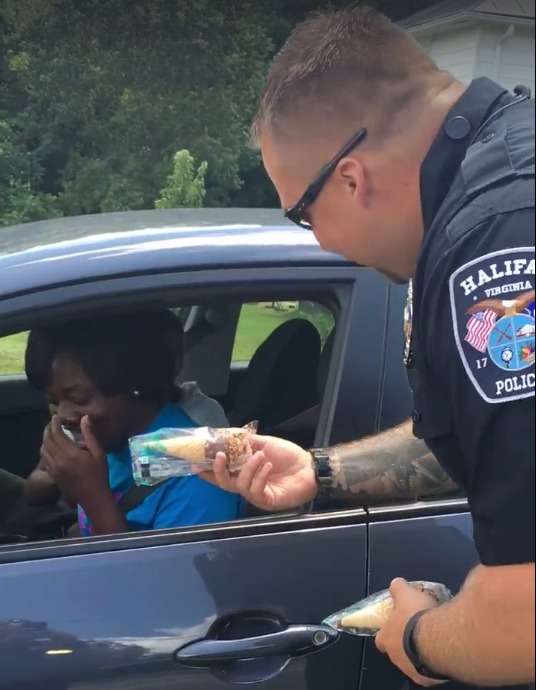Cops Who Stop Drivers to Give Them Stuff Are Abusing Their Power
Keep your ice cream, and I'll keep my freedom.

A white cop walks up to a car he has just stopped and asks the driver, a black woman, "Are you aware of why I pulled you over today?" The puzzled driver replies, "No, sir." The cop asks her if she is "familiar with Vehicle Code 1739." She is not, so he explains that "it's actually against the law to drive on a hot day without an ice cream cone." The driver laughs, either out of relief or amusement, as the cop hands her an ice cream cone. "Oh, my God!" she says repeatedly, laughing into her hand. She shakes the officer's hand as he wishes her a nice day.
Since viral videos of cops interacting with motorists usually involve abuses of power such as random searches, money grabs, bogus arrests, or the unjustified, occasionally fatal use of force, this episode, which was recorded in Halifax, Virginia, as part of Police Chief Kevin Lands' "attempt at developing better relations between police and the communities they serve," may seem like a refreshing change. But it also involves an abuse of power, albeit one disguised by benign intentions.
First, it's not clear there was a legal reason for pulling this woman over. WSET, the ABC station in Lynchburg, reports that Halifax police stopped about 20 drivers in one day "to hand out ice cream instead of tickets." It makes no mention of any traffic violations that might have justified the stops. Neither does the local CBS station. On Lands' Facebook page, where the video of the laughing motorist has been watched 7.7 million times, he describes the drivers who got ice cream as "speeders," which suggests cops ended up ignoring violations that supposedly were serious enough to pull people over. The woman in the video does not even get a warning, and there is no mention of any actual legal violation.
Cops have wide latitude to stop vehicles, but that latitude is not unlimited. "When the police pull over a car, that's a Fourth Amendment 'seizure' of the driver, any passengers, and everything inside," notes George Washington University law professor Orin Kerr at The Volokh Conspiracy. "To justify that seizure, the police need at least some cause either that a driver committed a traffic violation or that a person in the car is involved in a crime or wanted in connection with a serious crime. If the police have that cause, they can stop the car regardless of whether they want to write a ticket, investigate a crime or give the driver an ice cream cone. But the police can't pull over the car without any cause, even if they want to do something nice, such as give the driver a gift." Kerr also notes that the "something nice" could easily turn into something not so nice if a gift-bearing cop happens to notice illegal drugs or other evidence of lawbreaking.
The Halifax ice cream stunt reminds me of a program launched last year by the Macomb County, Michigan, sheriff's office that involved handing out gift cards to teenagers as a reward for good driving. In that case, the stops were clearly unconstitutional, since the teenagers were targeted for driving well—exactly the opposite of a legal justification. Other examples of cops pulling people over to give them stuff ostensibly involve actual traffic violations. In this 2014 video, a police officer in Lowell, Massachusetts, who gives a driver Christmas presents for her kids says he pulled her over for illegally tinted windows. In another video from the same year, a Covington, Louisiana, police officer gives a woman a $100 bill stamped "Secret Santa" after pulling her over, supposedly because she failed to stop completely at an intersection. He adds that giving her the present was "the real reason" for the stop.
The latter two examples would be deemed constitutional under the standard set by the Supreme Court, which says reasonable suspicion of a traffic violation makes a seizure legal even when it is not the real motivation for the stop. But these supposedly heartwarming interactions are still abuses of power. If police would not have stopped drivers for these minor violations unless they had gifts to hand out, they are deliberately inconveniencing people and causing them needless anxiety for the sake of a publicity stunt. The distribution of gifts is beneficent on the face of it, but it is a demeaning kind of beneficence given the inherently unequal relationship between a citizen and an armed agent of the state with the power to forcibly detain him. If someone without a badge (or with a fake one) made people pull their cars over so he could give them ice cream cones, he would be treated as a criminal, and the fact that he was only trying to put smiles on their faces would not be an admissible defense.


Show Comments (59)